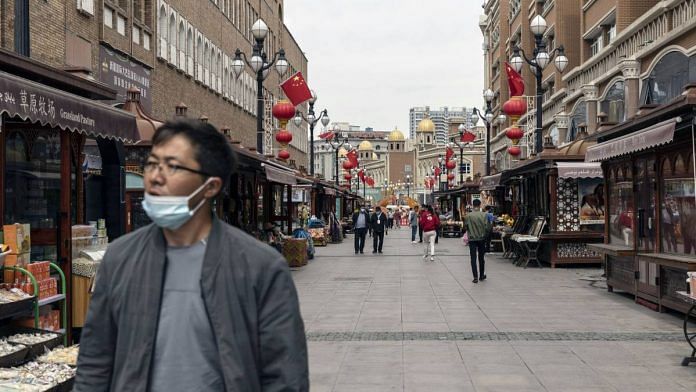As 2021 comes to an end, people across China are finding ways to celebrate amid Covid-19 restrictions. Though Christmas doesn’t hold much significance in China, people spend time shopping elsewhere in the world. The traditional Chinese calendar is based on the lunar cycle, and the Chinese New Year falls in February.
There are estimated to be around 100 million Christians in China, and protestant Christians are the most significant denomination. Despite the vast Christian population, the celebrations on Christmas are kept to various church denominations and privacy of homes. In 2014, people spent an average of $221 (1,379 RMB) on Christmas shopping, according to Horizon Research Consultancy.
Instead of Christmas, people celebrate the Dongzhi festival or the winter solstice festival, which marks the beginning of winter according to the traditional Chinese calendar. The winter solstice fell on 21 December, and celebrations will continue until 23 December. Winter solstice marks the shortest day and the longest night in the northern hemisphere.
To mark the Dongzhi festival, people in southern China, including Guangdong, Hong Kong, and other parts of Southeast Asia, make tangyuan balls from glutinous rice and water. People gather with their families to drink rice wine and tangyuan to mark family reunions. Since the winters in southern China are not as harsh as in the north, people eat relatively mild tangyuan.
A poem by Bai Juyi about the winter solstice from the Tang dynasty says, “There is no excitement in drinking alone, and there is no excitement at all. A glass of New Year’s wine, two poems from old friends.”
Also read: Xi Jinping wants Chinese artists and writers to practise ‘morality’. And a big editor quits
Warming up on food
In the north, people make dumplings (jiaozi), which provides the much-needed yang energy during long and cold nights of winter. These thick dumplings are usually filled with lamb meat, ginger, and garlic herbs to increase the warmth and stave off the winter. Wonton soup, along with dumplings, is particularly popular around Beijing and Suzhou during the winter solstice. Another popular dish is daikon radish
In the north and south of China, food is integral to the Dongzhi festival as people try to warm up during the cold and chilly nights. Dongzhi festival emphasises the need to pay attention to health and restore the balance of Qi energy during the winter months.
The hashtag “Do you eat dumplings or tangyuan for the winter solstice in your hometown” began trending on 20 December to mark the winter solstice. The hashtag was viewed 90 million times on Weibo. On Tuesday, the hashtag “What to eat during Dongzhi Festival” was viewed 1.63 billion times on Weibo and continued to grow.
Weibo users shared pictures of dumplings of various shapes, sizes and colours and asked others, “what did you eat for the winter solstice.”
The story of dumplings during the Dongzhi festival goes back to approximately the Han dynasty around 150 AD when a Chinese physician named Zhang Zhongjing invented dumplings. The legend says that Zhang returned home for winter and saw that people were suffering from frostbitten ears. Zhang wanted to help and so decided to make something with meat and herbs that looked like people’s ears – the shape of present-day dumplings.
Also read: A new white paper insists China is a democracy. It wants you to forget Tiananmen
Getting ready for Christmas
Besides eating nourishing and warm food, people also worship their ancestors as part of the traditional Chinese culture.
Another account of the winter solstice from a historical text called Rites of Zhou suggests people were already celebrating winter solstice as a state holiday by 2nd century BC. Rites of Zhou is a text of bureaucracy and organisational theory written by Zhao Gongdan, a writer, thinker and military strategist from the Western Zhou dynasty.
“Convene the deities in the heavens and the spirits of the dead on the day of the winter solstice,” says Rites of Zhou. The book is the first recorded text about emperors making in-person offerings during the winter solstice and describes the rituals involved.
China also acts as the biggest supplier of Christmas essentials globally.
People in Yiwu town in China’s Zhejiang province have been working overtime to fulfil the global Christmas orders for everything from lights to little pendants on top of the Christmas tree. Yiwu accounts for 80 per cent of exports related to Christmas products and has seen a 30 per cent increase in order from 2020.
Despite the trade tensions with the US, there is hope in Yiwu for the upcoming Christmas export cycle – notwithstanding some existing concerns.
The disruption caused by the Covid-19 pandemic has dampened the energy, but the Dongzhi festival will bring much-needed respite to the spirit.
The author is a columnist and a freelance journalist, currently pursuing an MSc in international politics with focus on China from School of Oriental and African Studies (SOAS), University of London. He was previously a China media journalist at the BBC World Service. He tweets @aadilbrar. Views are personal.
(Edited by Prashant)



